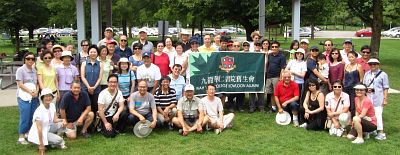Welcome to WYKAAO
Welcome to WYKAAO

Thanks to our 58 generous supporters, Team WYKAAO raised a good sum for the Terry Fox Run Foundation to fight cancer. We beat last year's goal by a short nose (5010/4900). It was a beautiful day for the run/walk. Our youngest member made a 10 Km Run, while others walked comfortably in the sun. After the event, they all visited the quaint village farmers' market.
Click here to view the photos and a short video here.
September 22 Thanks to our 59th supporter, Team WYKAAO has raised $5,210.
September 28 Thanks to our 60th supporter, Team WYKAAO has raised $5,360.
October 25 Acknowledgement from the Terry Fox Foundation
March 30, 2012 Acknowledgement from Rolly Fox
狄恆神父:香港及九龍華仁書院前校監、校長 - 捨己為仁
狄恆神父自50年代由愛爾蘭來港定居,先後管理華仁三十多年。他一生致力教育事業,積極推廣全人教育,實踐立己助人的教育理念。過去50年以無私愛心,努力培育年青一代,眾多學生早已在社會不同範疇,擔當重要角色。07年退休後,狄恆神父繼續參與公益事業,包括推動青少年德育發展、企業社會責任及關注脊髓損傷人士等,對社會貢獻良多。
Don Yau from Calgary, Heny Zee from LA and Francis Choi with Lydia from Beijing were entertained by the local Class of 65 members. Henry was last in Toronto for a world class Bridge Tournament in Royal York Hotel.
Sung Yun-wing with Pauline talked about his annual Marathons in Hong Kong.
Andrew Tang was the expert oganizers of the two lunches and the dinner. Click the image to view his pictures.
 You may notice there are some minor changes of menu items on this website. A new tab 'More' was created on the top (horizontal) menu that consists of sub-menu items of 'Forum', 'Reconnect with Classmates' and 'Academic Counselling'. Forum is previously on its own at the top menu and the other two items were under 'Main Menu'. The blog also has its dedicated tab on the top menu. Hopefully this re-arrangement will streamline the navigation and makes the website less cluttered. Please click here if you have any comments about the website.
You may notice there are some minor changes of menu items on this website. A new tab 'More' was created on the top (horizontal) menu that consists of sub-menu items of 'Forum', 'Reconnect with Classmates' and 'Academic Counselling'. Forum is previously on its own at the top menu and the other two items were under 'Main Menu'. The blog also has its dedicated tab on the top menu. Hopefully this re-arrangement will streamline the navigation and makes the website less cluttered. Please click here if you have any comments about the website.
 Mr. Tam writes from Hong Kong, (2011_09_04)
Mr. Tam writes from Hong Kong, (2011_09_04)
"I was invited to dinner with Fr Deignan last Friday evening. (See attached photo) At the table, sitting next to Fr Deignan was Prof Dominic Lam, President of World Eye Organization, next to me was Mr Edwin Wong, Managing Partner & CEO of SSG Capital Management (HK) Ltd, and on extreme right was Miss Janice Cooper, artist and art promoter. We were all very glad to see that Fr Deignan was fully recovered and in very good spirit. We had a lovely time together.
 Alex Cheng (’09) recently returned from a volunteer mission in Honduras and sent WYKAAO a thank-you letter,
Alex Cheng (’09) recently returned from a volunteer mission in Honduras and sent WYKAAO a thank-you letter,
“I have come back from Honduras!! It was the most AMAZING and MEANINGFUL trip ever!! We built a house for a single mother and her children. I met a lot of nice people from Canada, Honduras and even a student group from Oxford. I would say I am proud of my team because we worked our butts off even though it was like 40 degree, because we just wanted to get as much done as possible (see a video here). Unfortunately four team members got sick, but they recovered pretty soon. I am touched by the helpfulness of the Honduran neighbours because they had been really kind and provide everything we need such as washroom and storage space.
 (Aug 20th) On a weather-perfect Saturday, over 70 members and guests attended the 2011 WYKAAO picnic held in the beautiful Milne Dam Conversation Park. Everyone was having a good time chatting, catching up on latest developments among schoolmates and friends while enjoying all kinds of delicious food. The high-light of the fun-filled day was a surprise birthday celebration for our beloved Mr. Ho. Click the following to see the pictures (album-1, album-2).
(Aug 20th) On a weather-perfect Saturday, over 70 members and guests attended the 2011 WYKAAO picnic held in the beautiful Milne Dam Conversation Park. Everyone was having a good time chatting, catching up on latest developments among schoolmates and friends while enjoying all kinds of delicious food. The high-light of the fun-filled day was a surprise birthday celebration for our beloved Mr. Ho. Click the following to see the pictures (album-1, album-2).
As part of our Mon Sheong’s community services, a membership club for the seniors called the Mon Sheong Circle of Friends –Seniors (孟嘗之友-長者會所), or Senior Circle (長者會所) in short, was introduced on August 10, 2011. The intention of the new membership club is to help our seniors in our local community as much as possible and to provide a Centre where they can find friendship and care. It is a Centre where they can occupy themselves by participating in activities organised specially for them such as morning Tai Chi exercise, health dance, Karaoke, ping-pong and even mah-jong.
To Edmund Der of Class 1954 and Margaret. The Golden Jubilee Eucharist -- Marriage & Ordained Ministry of The Rev. Cannon Edmund & Margaret Der was celebrated on Saturday, August 13, 2011.
Please click the image for more photos.

From Mr. Laurence Tam in HK, "I have just returned from attending the Requiem Mass for Ms Hwong Yin Fong, Agnes.
As you probably know, Agnes was the music teacher of Wah Yan College, Kowloon in the years 1993 to 2006 and in the years 2010 to 2011. I had the chance of getting acquainted with her at the lunch gatherings of the retired teachers of WYK.
A form of regular lunch gathering of retired WYK teachers has been held for some time at Sun Sing Restaurant near WYK. It takes place once every three months. As usual, I took the opportunity to record those who took part in the lunch gathering a few months after my return to Hong Kong. Attached (click here) is one of the two pictures I took of the lunch gathering on 2 March 2010. There were two tables of retired teachers on that day. The attached shows those in one of them with Ms Hwong sitting on the extreme right. I did not see her in the last few WYK retired teachers luncheons. Then suddenly I got the sad news that she passed away. Being a member of the big family of WYK, I went to pay my respect to her and prayed for the peace of her soul this morning.
May she rest in peace in the arms of The Almighty."
Page 147 of 167